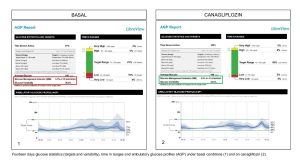Late Dumping syndrome (LDS) is a frequently described phenomenon after bariatric surgery. LDS starts 1 to 3 hours after a meal and is characterized by reactive hyperinsulinemic hypoglycemia (RHH), presenting with palpitations, sweating, tremor, irritability, or even unconsciousness. We present the case of a 60-year-old woman with type 2 diabetes, who complained symptoms of LDS after a gastric cancer gastrectomy. Dietary remodeling, with the appropriate percentage of lipids, proteins and carbohydrates with a low glycemic index was the first therapeutic approach for the patient. However it was not sufficient to reduce symptomatic hypoglycemic events. Therefore, we decided to start treatment with canagliflozin, a SGLT-1/SGLT-2 dual inhibitor, 300 mg before lunch. Before canagliflozin we performed the 75-g oral glucose tolerance test (OGTT) and the mixed-meal tolerance test (MMTT), both of which revealed RHH. We repeated the OGTT after canagliflozin treatment and the results showed the presence of symptomatic hypoglycemia without significant differences in peak insulin values compared to the OGTT performed before treatment. Instead, the MMT showed a small, flattened insulin response without any hypoglycemic episode. Furthermore, improvements were observed in glucose trends/targets as demonstrated by time in (TIR), above (TAR) and below (TBR) range as well as glucose variability based on data collected from Flash Glucose Monitoring before and during canagliflozin therapy (Fig. 1). The rapid emptying of undigested gastric contents into the small intestine is one of the most important pathophysiological processes in LDS. Canagliflozin, unlike other molecules in the same family, inhibits intestine SGLT-1. By delaying glucose absorption in the duodenum, it may lower postprandial glucose and insulin levels. Our case report, however, demonstrates that the effect of canagliflozin on glucose homeostasis is determined by appropriate dietary habits, which appear to be critical for successfully reducing symptoms of RHH after gastric bypass surgery.


